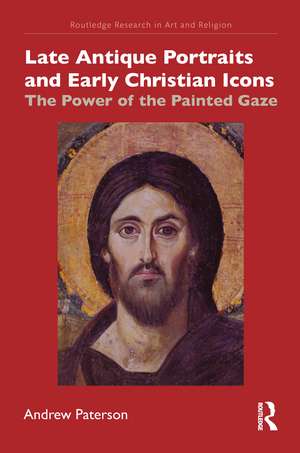Late Antique Portraits and Early Christian Icons: The Power of the Painted Gaze: Routledge Research in Art and Religion
Autor Andrew Patersonen Limba Engleză Paperback – 27 mai 2024
Andrew Paterson addresses two fundamental questions about devotional portraiture – both Christian and non-Christian – in the late antique period. Firstly, how did artists visualise and construct these images of divine or sanctified figures? And secondly, how did their intended viewers look at, respond to, and even interact with these images? Paterson argues that a key factor of many of these portrait images is the emphasis given to the depicted gaze, which invites an intensified form of personal encounter with the portrait’s subject.
The book will be of interest to scholars working in art history, theology, religion and classical studies.
Preț: 311.41 lei
Nou
Puncte Express: 467
Preț estimativ în valută:
59.59€ • 62.38$ • 49.31£
59.59€ • 62.38$ • 49.31£
Carte tipărită la comandă
Livrare economică 05-19 aprilie
Preluare comenzi: 021 569.72.76
Specificații
ISBN-13: 9780367697587
ISBN-10: 0367697580
Pagini: 228
Ilustrații: 142
Dimensiuni: 174 x 246 x 13 mm
Greutate: 0.45 kg
Ediția:1
Editura: Taylor & Francis
Colecția Routledge
Seria Routledge Research in Art and Religion
Locul publicării:Oxford, United Kingdom
ISBN-10: 0367697580
Pagini: 228
Ilustrații: 142
Dimensiuni: 174 x 246 x 13 mm
Greutate: 0.45 kg
Ediția:1
Editura: Taylor & Francis
Colecția Routledge
Seria Routledge Research in Art and Religion
Locul publicării:Oxford, United Kingdom
Public țintă
Postgraduate and UndergraduateCuprins
Introduction 1. The Production of Sacred Portraits (i): Techniques and Stylistic Variation 2. The Production of Sacred Portraits (ii): The Visualisation of the Prototype 3. The Reception of Sacred Portraits (i): Functions and Meanings of the Depicted Gaze 4. The Reception of Sacred Portraits (ii): Their Role in Spiritual Practice Conclusion
Notă biografică
Andrew Paterson is a Teaching Fellow at the University of Edinburgh.
Descriere
This book focuses on the earliest surviving Christian icons, dated to the sixth and seventh centuries, which resemble three other well-established genres of ‘sacred portrait’ also produced during late antiquity, namely Roman imperial portraiture, Greco-Egyptian funerary portraiture and panel-paintings depicting non-Christian deities.








